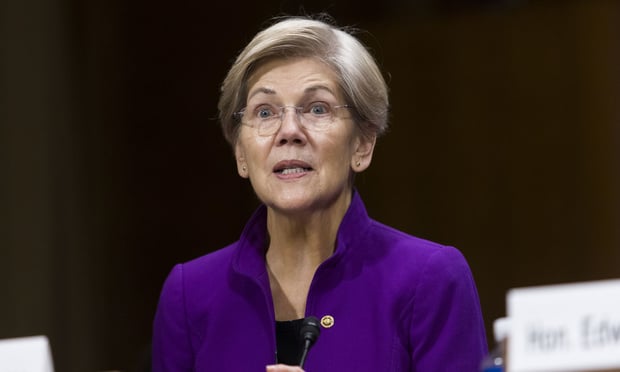 Sen. Elizabeth Warren, D-Mass. Photo: Diego M. Radzinschi/ALM
Sen. Elizabeth Warren, D-Mass. Photo: Diego M. Radzinschi/ALM
Hell has not frozen over, and death and taxes still exist, but Sen. Elizabeth Warren, D-Mass., and Sen. Josh Hawley, R-Mo., have joined to introduce a pharmacy benefit manager control legislation, the Patients Before Monopolies Act bill.
The bill also has bipartisan support in the House, with Reps. Diana Harshbarger, R-Tenn., and Jake Auchincloss, D-Mass., introducing the legislation in that chamber.
Recommended For You
The bill would prohibit any person from owning a pharmacy and an insurance company at the same time or from owning a pharmacy benefit manager and a pharmacy at the same time.
The top targets of the bill are Cigna's Express Scripts business, CVS Health's Caremark and and UnitedHealth's OptumRx.
The backdrop: PBMs help health insurers, employers' self-funded health plans and other entities that pay for health care provide prescription drug benefits for the insureds.
Independent pharmacies and the FTC have argued that the big PBMs are using their massive size and pharmacy subsidiaries to take revenue away from independent pharmacies, steer patients toward PBM-owned pharmacies that charge high prices, and keep a large percentage of the value of any discounts they manage to get from drug manufacturers.
The sponsors' thinking: Warren said the new bill would rein in vertically integrated PBMs' conflicts of interest.
"PBMs have manipulated the market to enrich themselves — hiking up drug costs, cheating employers and driving small pharmacies out of business," Warren said.
Related: Why such 'high markups'? Senators seek drug price probe of insurers who own PBMs
The PBMs' view: JC Scott, the CEO of the PBMs' trade group, the Pharmaceutical Care Management Association, said in a response to the new PBM bill that PBMs exist to help patients get access to affordable prescription drugs.The new PBM bill "would severely limit access to safe and affordable pharmacies that patients value and rely on for prescription drugs," Scott said.
PBM-affiliated pharmacies, including mail-service and specialty pharmacies, are already saving patients money, and mail-service pharmacies could save patients, employers and public health plans $23.5 billion over 10 years, Scott said.
Scott said PBMs' specialty drugs can cut the cost of very expensive drugs by up to 45%.
"Congress should be thoughtful in understanding the value that PBMs provide before taking away consumers' ability to access their medicines how and where they'd like, while making the cost of prescription drugs more expensive," Scott said.
Bill details: The bill would give insurers and PBMs that now own pharmacies three years to divest the pharmacies. After three years, federal regulators and state attorneys general could sue in federal court to require an insurer or PBM to separate from its pharmacy.
"Any revenue received from the sale of prescription drugs disgorged pursuant to an action under this subsection shall be deposited in a fund created by the Federal Trade Commission and distributed by the Federal Trade Commission to be put to use in the interest of serving the health care needs of the harmed community, including consumers overcharged at vertically integrated pharmacies, according to the bill text.
The bill defines a PBM as an entity that negotiates drug prices, rebates, fees or discounts for a health plan or health plan sponsor or provides network management services or prescription administration services for a health plan.
The bill defines a "health plan" as including "any public or private health insurance plan."
Prospects for passage: The current Congress will end Jan. 3, 2025, but lawmakers are negotiating several "must-pass" pieces of legislation for authorizing defense spending, keeping the government from shutting down and creating a disaster recovery package.
Congress could use any of the must-pass measures as an engine for pulling a PBM bill or other bill through Congress.
Jason Borschow, the president of Abarca Health, a PBM that says it uses a more transparent approach than the big PBMs do, said recently at a health care conference organized by Forbes that Congress was likely to pass a PBM bill.
"The only issue that Democrats and Republicans are completely aligned on is that PBMs should be regulated by the government," Borschow said.
Senate mechanics could help the opponents of the bill block it there. Legislation included in budget packages must be "germane" to the federal budget to get through the Senate with just 51 votes, rather than the 60 votes normally required.
If any significant opposition surfaces, the need to smooth the way for the big, must-pass packages to move quickly may push the PBM Act bill out and force the sponsors to reintroduce the bill in the next Congress.
© Touchpoint Markets, All Rights Reserved. Request academic re-use from www.copyright.com. All other uses, submit a request to [email protected]. For more inforrmation visit Asset & Logo Licensing.






